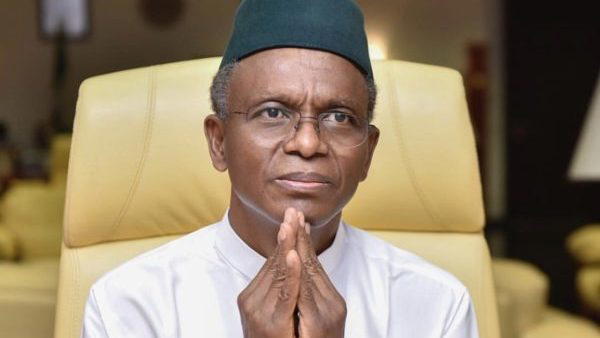
Governor Nasir El-Rufai
By Clifford Ndujihe
The APC had, in August 2017, set up a 23-man committee on True Federalism headed by the then Governor of Kaduna State, Malam Nasir el-Rufai.
The committee submitted its report on January 14, 2018.
It was saddled with the duty of distilling the actual intent and definition of true federalism as promised by the APC during its 2015 electioneering campaign, and to study the reports of the various National Conferences, especially that of 2014 and come up with recommendations on restructuring the country.
Section 7 (2) of the APC constitution provided for restructuring and fiscal federalism, among others.
In 2015, the APC promised “to initiate action to amend the Nigerian constitution with a view to devolving powers, duties and responsibilities to states in order to entrench true federalism and the federal spirit.”
The committee engaged 8,014 people across the country and came up with 24 issues, which Nigerians indicated interest on. And, out of the 24 issues, they made 12 important recommendations based on the opinions of Nigerians.
Receiving the report, on January 25, 2018, the then National Chairman of APC, Chief John Oyegun, said that by the middle of February 2018, all structures of the party would have met and considered the report.
*Merger of states
Instead of new states, the El-Rufai committee toyed with merger of states, and proposed a draft bill that will allow states to merge if they so desire, stating that only 36 per cent of Nigerians want more states to be created.
*Devolution of Power
The committee noted that there was an overwhelming demand for the devolution of power to the States by the Federal Government, and proposed that the Second Schedule of Part One and Part Two of the Constitution should be amended to transfer some items that are now on the Exclusive List to the Concurrent List that will enable both the states and the federal government to legislate on them.”
The items include: food and drugs, fingerprint identification of criminals, registration of business names, labour matters, mines and minerals, the Police, prisons, public holidays, and stamp duties.
*Fiscal Federalism
The committee noted that the majority of Nigerians advocated for states to receive more revenue than the federal government. This would see states taking more responsibilities and drastically reducing their reliance on the federal government to meet their needs.
It proposed amendment of Section 162 and sub-section two of the Constitution as well as the review of Federation Account Act to give more revenue to the states and reduce the federal government’s share of revenue.
*Judiciary
On the judiciary, the committee noted that the National Judicial Council as the single judicial body in Nigeria operates a unitary judicial system in a federal system, and proposed amendment to the Constitution to create a state judicial council that will appoint and discipline judges in a state while the National Judicial Council will exercise control over the appointments, discipline of judges of the federal government only.”
*Local government autonomy
The committee recommended two tiers of government and canvassed that the state should be allowed to enact laws on local government administration as deemed peculiar to each of them.
*Revenue allocation, resource control
Based on the growing agitation by states to exercise control over natural resources within.
Disclaimer
Comments expressed here do not reflect the opinions of Vanguard newspapers or any employee thereof.